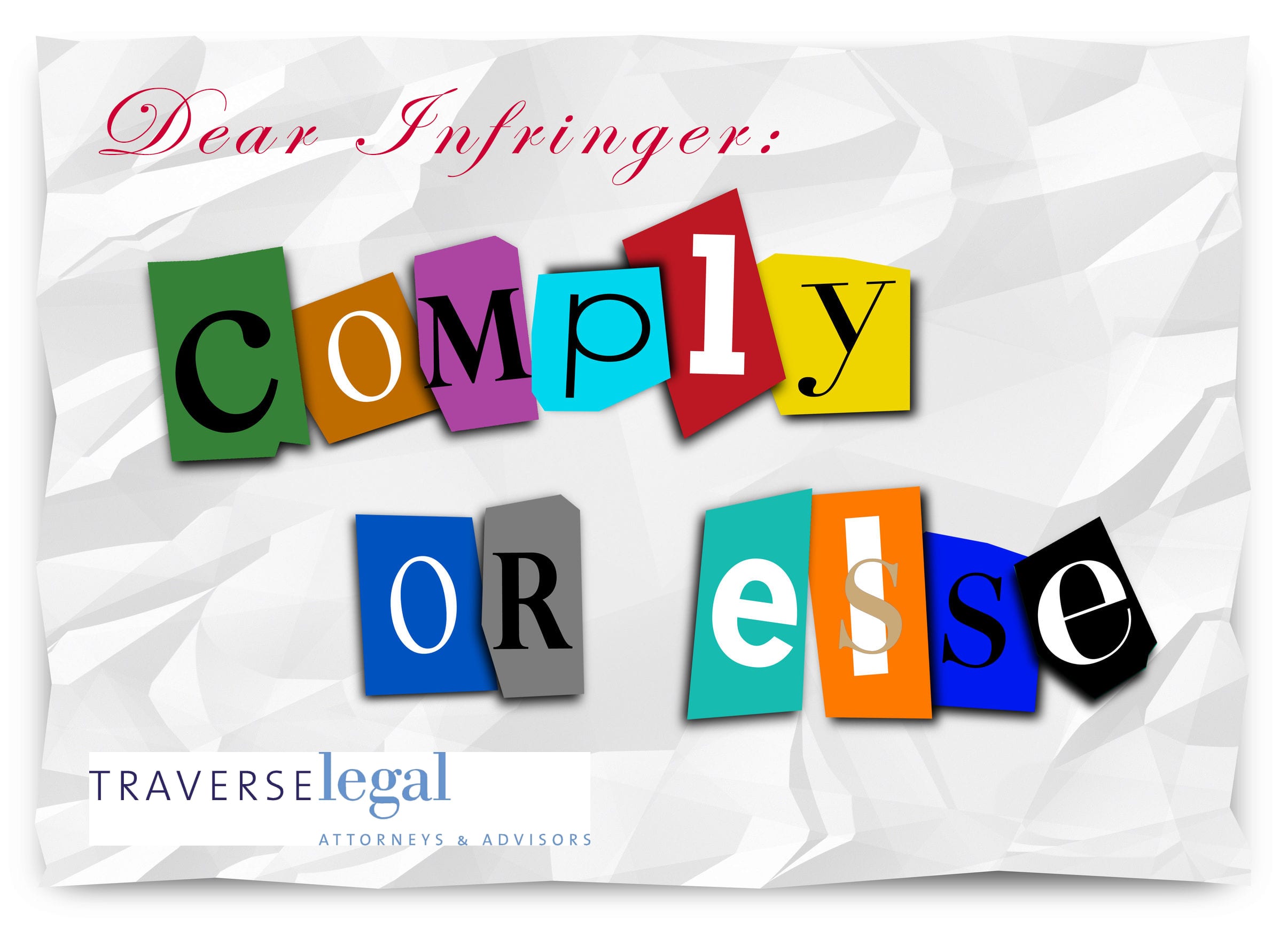Enrico Schaefer - February 26, 2013 - Cease and desist letters, Copyright Law, Internet Copyright Infringement

You think someone is infringing your copyright. You see that they’ve posted something that belongs to you on the Internet, either a picture or a photograph or a piece of art or a literary work or a design, and you believe that a cease and desist letter should be sent. They do not have a valid copyright license to use your work.
Pro Tip: Take a breath and read this article before doing anything.
Now, there is no question that sending a cease and desist letter is one of the standard items that any copyright law attorney is going to look at as an option, once you come through the door and you tell that copyright lawyer your problem.
Copyright infringement on the internet is rampant. The cut and paste mentality has created a big problem for copyright owners looking to protect their copyright and stem the tide of infringement. No one can use your authored works with license or permission. If you find your copyright protected works on the internet, you have the right to demand take-down and damages. But taking the first ‘right’ step in enforcing your copyright is critical.
Your copyright attorney should NEVER send a copyright cease and desist letter that is a form threat letter, contains boilerplate legal language or comes from a ‘sample’ cease and desist posted on a website. No experienced copyright lawyer worth their salt ever sends cease and desist form letters. Here is why.
Your copyright, your situation and the infringement are all unique. Form threat letters are often seen as weakness, or demonstrate a lack of seriousness. Boilerplate copyright infringement threat are often ignored. Once ignored, it is hard to obtain the leverage you need with a second or third cease and desist letter. Customizing your threat letter to best assert your copyright claim is important.
Copyright Tip: Hire a real copyright attorney to get it right the first time.
If you do NOT have the money to hire a real copyright attorney who knows how to write a custom threat letter, then you might have to engage in self-help. [If you are stuck and don’t have money top pay a competent attorney, scroll down for some free cease and deist samples, forms, templates]. Boilerplate cease and desists should be your last resort.
A penny saved now could cost you big time later. Do it right. Get it right.
So, if sending a form cease and desist letter is the wrong way to go, what should you do first to protect your copyrighted authorship? Did you ever hear the saying “you only get one chance to fire the first shot?”
Pro Tip: Make sure your first shot counts.

Your copyright lawyer needs to analyze the matter, and make sure you send the right letter, with the correct facts, the right tone, and the demands that meet client goals. Your first letter is the most important. Getting it right is critical. If you first letter hits the target, you end up with a quick resolution. If your copyright threat letter falls flat, you could end up spending a lot more in attorney fees and undermine your goals. Would you rather spend $3,000 in attorneys fees now for a quick result, or $15,000 over 6 months and potentially get nowhere? A $1,000 boilerplate letter may end up costing you big time.
Before you send a copyright infringement threat letter, you should first do an assessment of the merits of your case; understand the strengths and weaknesses of your potential copyright infringement claim. Who the infringer and what other legal or non-legal leverage exists against them? Often, the combination of legal and non-legal leverage is the key to early success.
Question 1: Should I send a cease and desist threat letter to someone using my copyright protected picture, video or other work without my permission? This is an important question that too many clients fail to ask. Everyone wants to start with an aggressive threat letter before fully analyzing the situation. If it turns out you don’t own the copyrighted work, or there is a viable defense such as license or fair use, you risk getting sued by the person or company you are threatening.
Copyright Tip: You can get sued by the recipient for a declaratory judgment for a judgment of non-infringement if you send a threat letter.
You think someone is infringing your copyright. You see that they’ve posted something that belongs to you on the Internet, either a picture or a photograph or a piece of art or a literary work or a design, and you believe that a cease and desist letter for copyright infringement should be sent. You may, or may not, be willing to offer a copyright license as part of a settlement and release for infringement. A lawyer who understands copyright cease and desist letters knows how to assess, threaten, to settle and when to litigate copyright infringement claims.

Developing the right strategy requires something more sophisticated than a knee jerk shotgun blast. An experienced copyright attorney will dig into the background facts, do independent research about the infringing use and the infringing user. A great copyright lawyer will consider all options, before recommending a cease and desist approach, and then avoid a templated boilerplate approach. Learn more in this article where copyright attorney Enrico Schaefer addresses the nuances of copyright infringement on the internet, and how to deal with your unique situation. A copyright infringement Assessment and Strategy project typically has five basic components:
Once you understand the merits of your copyright infringement claim, the legal defenses and the leverage, you can agree on a documented strategy and execute that strategy. Even if you decide to send a copyright cease and desist letter, you still need to set the right tone, emphasize the right leverage and make the right initial demands.
Keep reading this article on copyright infringement cease and desist letters to learn what one top copyright infringement attorney advises his clients in every copyright case.
My name is copyright law attorney Enrico Schaefer, and I’m here to tell you that you don’t always send a cease and desist letter when you see a problem with Internet-based copyright infringement. There are certain circumstances where sending a copyright cease and desist letter for infringement is the wrong move.
Let’s talk a little bit about the circumstances where copyright cease and desist letters are appropriate. The first thing that any good copyright attorney is going to do, once you come through the door as a perspective client, is get the background information, get the facts. One of the things that that copyright attorney is going to do is to grill you to better understand your claim of copyright ownership over the work. Many people do not understand what it takes to be the author of an original work that is subject to copyright. Sometimes we’ll find out that the person who claims ownership of the photograph, for instance, isn’t the photographer. The photographer is a friend or works for them or took the picture for them, but they have no agreement with that photographer over an assignment of the copyright, or obtaining that copyright is part of work-for-hire or an assignment of the copyright or a license to the copyright going to someone who wasn’t actually taking the picture.
So the first thing a good attorney is going to do is to better understand who took the photograph, who put pen to paper on the original literary work, whether or not other people contributed to that literary work, and is going to validate the strength of your claim of copyright ownership.
The last thing you want to be doing is putting a copyright infringement or a Digital Millennium Copyright takedown notice in play if you’re not truly the copyright holder. Many lay people do not understand what it takes to become the legitimate holder of a copyright.
The next thing that the attorney is going to do is to better understand what you’ve done in terms of registering your copyright, and to make sure that if you have registered your copyright, that in fact it was done properly and that there were proper disclosures about all the people who contributed to the work, etc. These are very important issues.
If you’re in a band and there’s a song that your group came up with and everyone in the band contributed to writing the song and the music for the song, and in fact the performance of the song, then the question is very quickly going to become: Who is the copyright owner of that work, whether or not it’s the actual song notes on paper or performance of the song with the lyrics? So you need to understand these issues. Just because you are the lead singer of the band doesn’t mean you are the copyright owner of the work.
If you have not registered the copyright with the U.S. Copyright Office, or otherwise in a foreign jurisdiction, then you need to understand, before you send a cease and desist letter or a threat letter, what leverage you do and do not have. It may very well be that you have no right to file a Federal Court lawsuit under the Copyright Act if you have not registered the copyright.
So what are the alternatives to a cease and desist letter for copyright infringement? Well, there are many instances where, instead of threatening the person who has posted something that you believe is infringing the copyright, that we will engage the person in a conversation in order to find a solution.
Keep in mind you may have a limited problem now in that your copyright protected work is posted on one website. What you want to avoid is that that becomes 10 websites or 100 websites. So making the other side angry if you have really weak claims may not be your best move.
A good copyright attorney is going to find out what your goal is. If your goal is to simply have the work taken down, then a DMCA or Digital Millennium Copyright Act takedown notice may be appropriate, assuming that you can properly claim copyright ownership. If you want a cease and desist order, you will need to file a lawsuit and go to court. That can be expensive. If you are willing to license the work as part fo a settlement, then your copyright attorney needs to know that up front.
But then the question, again, becomes: Does it go back up? So a lot of times you’ll want to engage the person who posted the work.
There are options out there. Sometimes sending a cease and desist letter or a threat letter to someone will merely provoke them to further violate your copyright. So sometimes you need to come with more leverage than a cease and desist letter. Sometimes you have to file a copyright infringement lawsuit right out of the gate because it is just that serious.
My name is copyright law attorney Enrico Schaefer. You’ve been listening to Copyright Law Radio, and we’ll see you next time.
You’ve been listening to Copyright Law Radio, where copyright infringement, licensing, litigation, and news are always the topic of the day. Whether you are a copyright attorney or a client, we are the number one resource for all your copyright questions.
Contact one of our copyright lawyers for more information.
Of course we recommend you hire a copyright attorney to help you handle infringement issues. But if you can not afford an attorney, free self-help legal forms and templates can be invaluable. Do it yourself (DYI). We get it. And we love helping our community of creatives, even you are going to go it alone 🙂 [No representations or warranties are made by providing the free forms, templates and links found below. (copyright infringement cease)]
Copyright Trial Attorney Enrico Schaefer